6 Powerful Ways to Use AI for SEO in 2025
The relationship between artificial intelligence and search engine optimization has evolved dramatically over the past few years. What was once viewed with skepticism or even fear by many SEO professionals has now become an essential component of successful search strategies. In 2025, AI isn’t replacing SEO—it’s revolutionizing it.
As search engines continue to sophisticate their use of machine learning and natural language processing, marketers who leverage AI tools strategically advance their search visibility. The landscape has shifted from simply climbing a list of blue links to optimizing for AI-powered features like Google’s AI Overviews, voice search results, and alternative search engines.
This transformation presents both challenges and opportunities. Zero-click searches are rising exponentially, with Google’s AI Overviews appearing in nearly 20% of search results by late 2024. Meanwhile, alternative AI-powered search engines like ChatGPT Search and Perplexity are gaining traction, creating new referral traffic sources for savvy marketers.
In this comprehensive guide, we’ll explore six powerful ways to use AI for SEO in 2025, helping you navigate this new terrain and leverage artificial intelligence to boost your search visibility.
Key Highlights
- AI is transforming SEO in 2025, creating new opportunities for marketers who adapt their strategies
- Natural Language Processing (NLP) tools can significantly improve keyword research by identifying high-value long-tail keywords
- AI content assistants help create more comprehensive, optimized content that satisfies both search engines and users
- Technical SEO audits can be automated and enhanced with AI tools that identify issues human analysts might miss
- Voice search optimization is becoming critical as AI assistants increasingly mediate search experiences
- Predictive analytics powered by AI can forecast SEO trends and help marketers stay ahead of algorithm changes
TABLE OF CONTENTS:
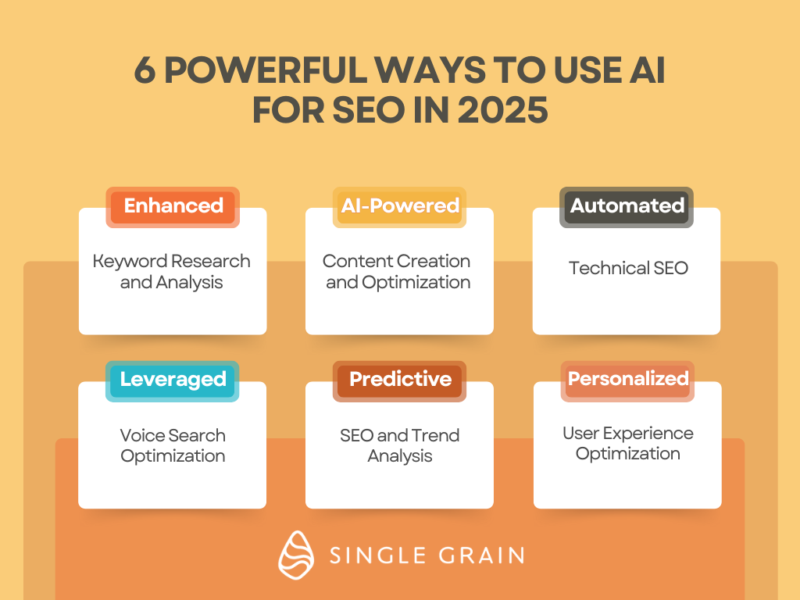
1. Enhanced Keyword Research and Analysis
Traditional keyword research often focused on search volume and competition metrics. While these remain important, AI has transformed how we identify and target keywords by providing deeper insights into search intent and semantic relationships.
Understanding Search Intent Through AI
AI-powered keyword research tools now analyze the context and intent behind search queries with remarkable accuracy. Rather than simply matching keywords, these tools help you understand what users are truly seeking when they type a query.
For example, when someone searches for “best coffee maker,” are they looking for product reviews, comparison guides, or ready to make a purchase? AI tools can distinguish between informational, navigational, and transactional intent, allowing you to create content that precisely matches what users want.
Discovering Semantic Relationships
Modern search engines don’t just match exact keywords—they understand topics and concepts. AI tools can map the semantic relationships between keywords, helping you identify related terms that might not be obvious through traditional research.
“AI excels at identifying semantic relationships between keywords that humans might miss,” explains SEO expert Lily Ray. “This allows for more comprehensive topic coverage and better alignment with how search engines understand content.”
Uncovering Long-Tail Gold
Perhaps the most valuable application of AI in keyword research is its ability to identify long-tail keywords with high conversion potential. While these specific phrases may have lower search volumes individually, collectively they can drive significant qualified traffic.
AI tools can analyze vast amounts of data to identify these opportunities, often discovering phrases that traditional keyword research would overlook. For businesses in competitive niches, these long-tail terms represent valuable opportunities to attract highly targeted traffic.
Practical Application
Tools like Semrush’s AI Keyword Magic Tool, MarketMuse, and even ChatGPT can help with this enhanced keyword research. For example, you might prompt ChatGPT with:
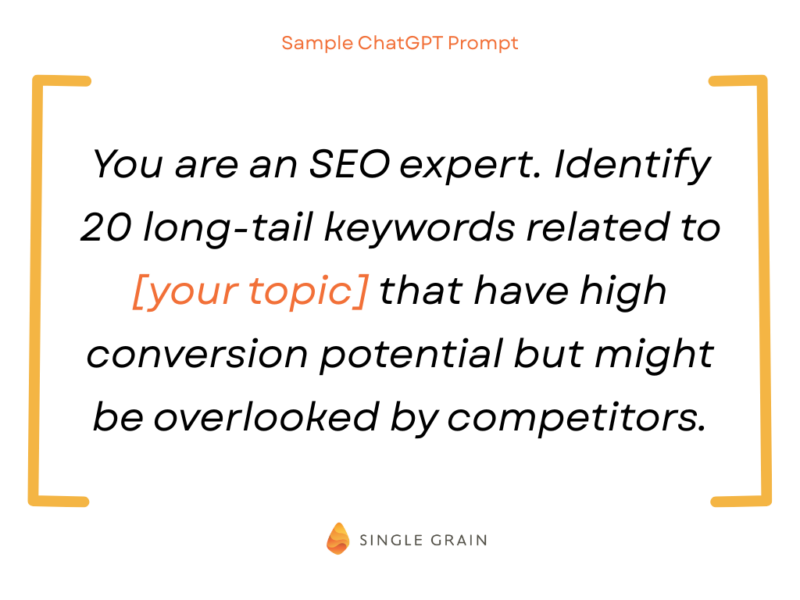
The results can then be verified against traditional keyword research tools to confirm search volume and competition metrics.
2. AI-Powered Content Creation and Optimization
Content remains the foundation of SEO success, but AI has transformed how we approach content creation and optimization. From generating comprehensive outlines to ensuring content satisfies search intent, AI tools have become invaluable allies for content creators.
Comprehensive Content Briefs
AI tools can analyze the top-ranking content for your target keywords and generate detailed briefs that include:
- Essential subtopics to cover
- Questions your content should answer
- Optimal content length and structure
- Semantic keywords to include
- External sources to reference
These AI-generated briefs help ensure your content covers the topic comprehensively, addressing all aspects that search engines consider relevant to the query.
Content Gap Analysis
One of the most powerful applications of AI in content optimization is identifying gaps in your existing content compared to top-ranking competitors. AI tools can analyze your content alongside competitors to pinpoint:
- Topics you’ve missed
- Questions you haven’t answered
- Depth of coverage disparities
- Media types that could enhance your content
According to a 2024 study by Backlinko, content that comprehensively covers a topic is 1.5 times more likely to rank in the top three positions than content that only addresses the primary keyword.
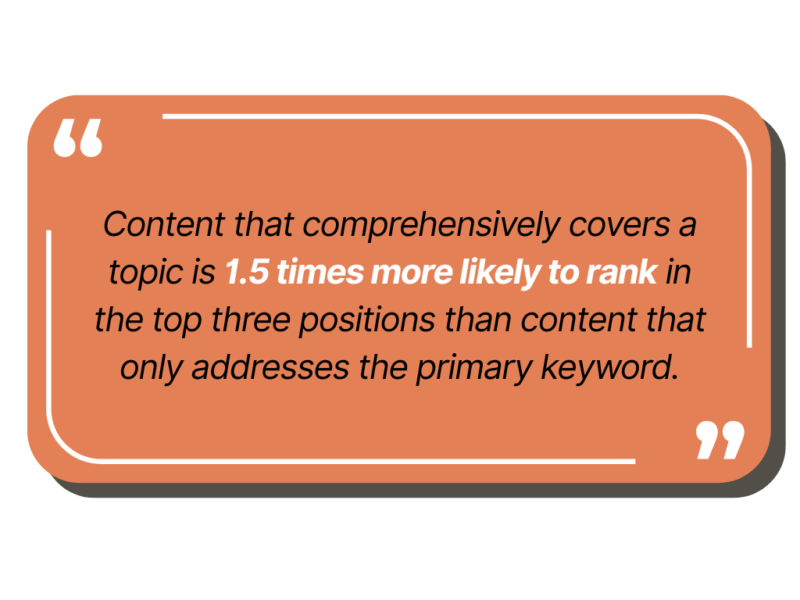
Optimizing for Featured Snippets and AI Overviews
With zero-click searches on the rise, optimizing for featured snippets and AI Overviews has become essential. AI tools can help identify opportunities to format your content in ways that increase the likelihood of being featured.
This includes structuring content with:
- Clear, concise definitions
- Step-by-step instructions
- Bulleted or numbered lists
- Tables for comparison data
- FAQ sections that directly answer common questions
While Google’s AI Overviews typically include multiple citation links, being featured can significantly increase your visibility even without direct clicks.
Balancing AI and Human Creativity
Despite advances in AI content generation, the most successful approach combines AI assistance with human expertise. As Google’s helpful content guidelines emphasize, content should demonstrate “first-hand expertise” and provide unique value beyond what AI alone can generate.
“The key is using AI as a tool to enhance human creativity, not replace it,” says content strategist Ryan Robinson. “AI can help ensure comprehensive coverage and technical optimization, while humans provide the unique insights, experiences, and brand voice that truly connect with readers.”
For businesses running paid media campaigns, particularly on LinkedIn, this balance is especially important. Tools like Karrot.ai can help transform your LinkedIn ads with 1-1 personalized content that combines AI efficiency with human-like personalization, resulting in ads that actually convert.
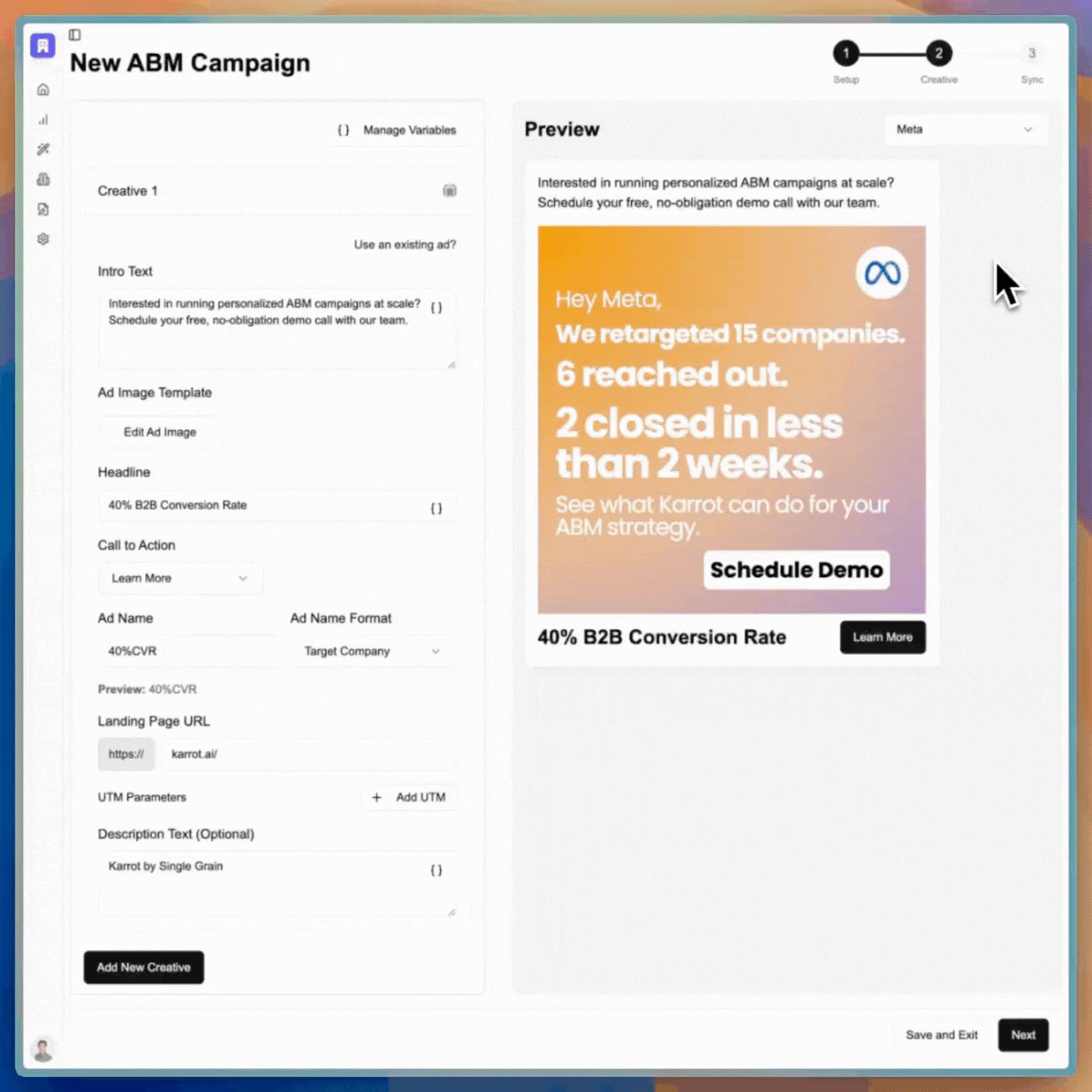
3. Technical SEO Automation
Technical SEO has traditionally been one of the most time-consuming aspects of search optimization. AI tools have dramatically improved our ability to identify and resolve technical issues at scale.
Comprehensive Site Audits
AI-powered crawling tools can now scan websites with unprecedented speed and accuracy, identifying technical issues that might impact search performance. These tools go beyond simple checklist items to understand how technical factors interact with each other and affect overall site health.
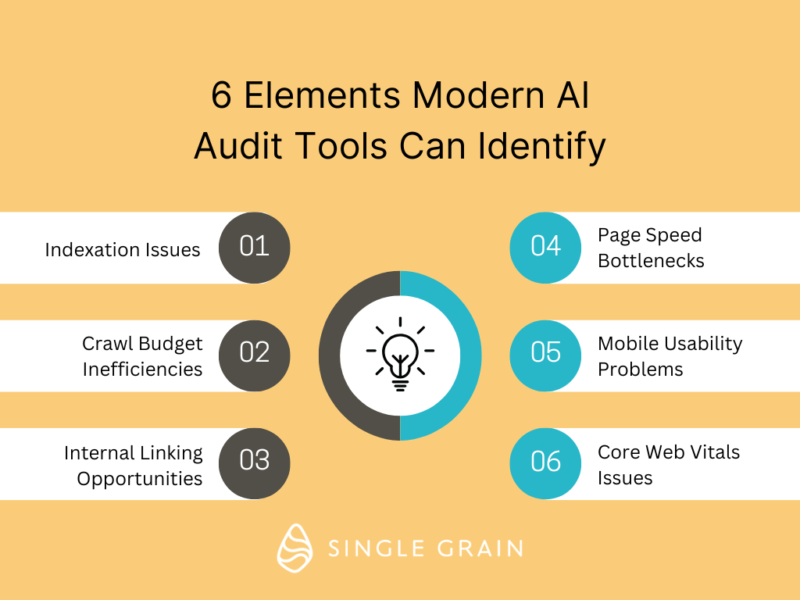
Modern AI audit tools can identify:
- Indexation issues
- Crawl budget inefficiencies
- Internal linking opportunities
- Page speed bottlenecks
- Mobile usability problems
- Core Web Vitals issues
The advantage of AI-powered audits is their ability to prioritize issues based on their likely impact on search performance, helping SEO teams focus on the most critical problems first.
Automated Schema Implementation
Structured data has become increasingly important for search visibility, especially for featured snippets and rich results. AI tools can now analyze your content and automatically generate appropriate schema markup.
This automation ensures your content is properly tagged for search engines to understand, increasing the likelihood of enhanced search results without the tedious process of manual schema implementation.
Predictive Issue Detection
Perhaps most impressively, AI tools can now predict potential technical issues before they impact your search performance. By analyzing patterns and trends across your site, these tools can alert you to emerging problems that might not be apparent through traditional auditing.
For example, AI might detect that a particular template change is causing gradual increases in page load time across certain sections of your site, allowing you to address the issue before it triggers performance penalties.
Practical Application
Tools like Alli AI, Deepcrawl, and Screaming Frog with AI integrations can automate much of your technical SEO work. Many enterprise SEO platforms now include AI-powered technical auditing features that can save hours of manual analysis.
4. Voice Search Optimization
As voice assistants become increasingly integrated into daily life, optimizing for voice search has evolved from a nice-to-have to a necessity. In 2025, voice search optimization requires a dedicated strategy that leverages AI to understand and target conversational queries.
The Growing Importance of Voice Search
According to recent data, over 40% of adults now use voice search daily, with that number expected to continue growing. Voice searches are typically longer, more conversational, and often phrased as questions compared to typed queries.
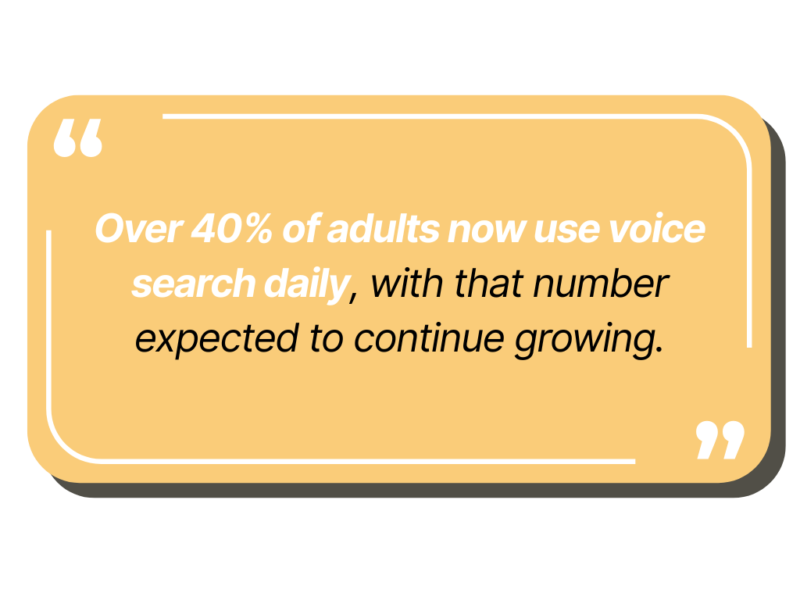
AI tools can analyze voice search patterns specific to your industry, identifying the conversational phrases and questions most commonly used when people search by voice.
Optimizing for Conversational Queries
Voice searches tend to be more conversational and question-based than typed searches. AI tools can help identify these natural language patterns and suggest content structures that align with how people actually speak.
For example, while someone might type “best running shoes flat feet,” they might ask a voice assistant, “What are the best running shoes for someone with flat feet?” AI tools can help you optimize for both formats.
Structured Data for Voice Search
Voice assistants often pull information from structured data when answering questions. AI tools can help implement the specific schema markup types that voice assistants prefer, increasing your chances of being the source for voice search answers.
Creating FAQ Content
One of the most effective strategies for voice search optimization is creating comprehensive FAQ content that directly answers common questions. AI tools can analyze search data to identify the most frequently asked questions in your niche and suggest optimal answer formats.
Practical Application
Tools like Yext, BrightLocal Voice Search, and even ChatGPT can help identify voice search opportunities. For example, you might prompt ChatGPT with:
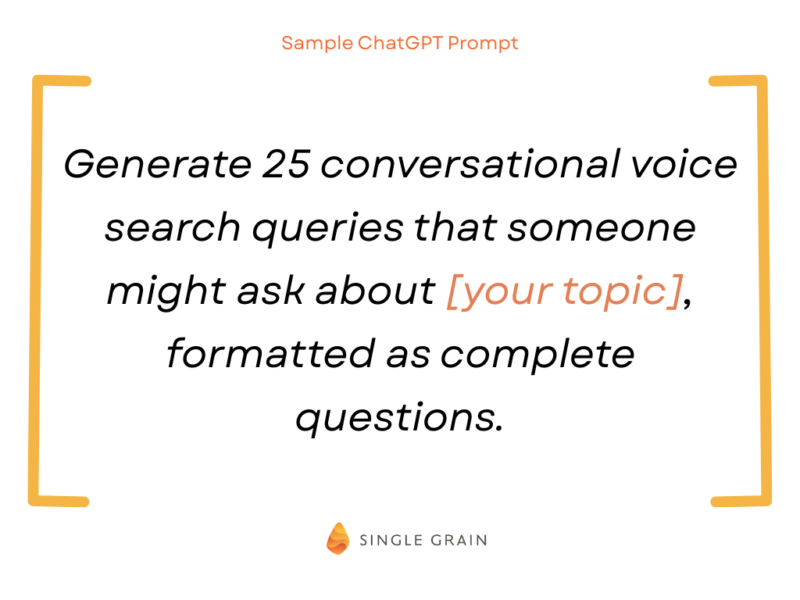
5. Predictive SEO and Trend Analysis
One of AI’s most powerful capabilities is its ability to analyze vast amounts of data to identify patterns and predict future trends. In SEO, this translates to getting ahead of search trends before they peak.
Forecasting Search Trends
AI-powered trend analysis tools can identify emerging search patterns before they become mainstream. By analyzing search volume changes, social media mentions, news coverage, and other signals, these tools can alert you to topics that are gaining momentum.
This predictive capability allows you to create content for emerging topics before competition intensifies, positioning you as an early authority when search volume grows.
Algorithm Change Predictions
Search algorithms are constantly evolving, with major updates potentially disrupting rankings. AI tools can analyze patterns from previous algorithm updates and monitor current search behavior to predict potential changes.
While no tool can predict algorithm updates with perfect accuracy, AI-powered monitoring can identify early signals of change, allowing you to adapt your strategy proactively rather than reactively.
Competitor Gap Analysis
AI tools can continuously monitor your competitors’ content and SEO strategies, identifying new keywords they’re targeting, content gaps they’re filling, and backlink sources they’re acquiring.
This competitive intelligence allows you to stay ahead of industry trends and ensure your SEO strategy remains competitive in a rapidly changing landscape.
Data Visualization for Insights
Making sense of complex SEO data can be challenging. AI-powered visualization tools can transform raw data into actionable insights, helping you identify patterns and opportunities that might not be apparent in spreadsheets or reports.
These visualizations can reveal relationships between different aspects of your SEO performance, helping you make more informed strategic decisions.
Practical Application
Tools like Google Trends with AI integration, BrightEdge, and Conductor Searchlight offer predictive SEO capabilities. Many SEO platforms now include AI-powered forecasting features that can help you stay ahead of trends.
6. Personalized User Experience Optimization
Search engines increasingly factor user experience into ranking decisions. AI tools can help optimize the user experience by analyzing behavior patterns and personalizing content delivery.
Analyzing User Behavior
AI can analyze how users interact with your site, identifying patterns that indicate engagement or frustration. These insights go beyond basic metrics like bounce rate to understand the nuanced ways users engage with your content.
For example, AI might identify that users who arrive from certain search queries tend to scroll further down the page but rarely click on your call-to-action buttons, suggesting a misalignment between search intent and your content.
Creating Personalized Experiences
Based on user behavior analysis, AI can help create personalized content experiences that adapt to individual users’ needs and preferences. This might include:
- Dynamically adjusting content based on user location
- Recommending related content based on browsing history
- Customizing calls-to-action based on user behavior
- Adapting navigation paths based on entry points
Research shows that personalized experiences can increase engagement metrics that correlate with better search rankings, creating a virtuous cycle of improved user experience and search visibility.
A/B Testing Automation
AI can dramatically improve the efficiency and effectiveness of A/B testing for SEO. Rather than testing one variable at a time, AI-powered testing can analyze multiple variables simultaneously to identify optimal combinations.
This multivariate testing approach allows you to optimize your content, design, and user experience much more quickly than traditional methods.
Enhancing Conversion Rates
Ultimately, the goal of SEO is not just to drive traffic but to convert that traffic into meaningful actions. AI tools can analyze user journeys to identify conversion bottlenecks and suggest optimizations to improve conversion rates.
For businesses running paid media campaigns, tools like Karrot.ai take personalization to the next level by enabling 1-1 personalized LinkedIn ads that dramatically improve conversion rates compared to generic advertising.
Practical Application
Tools like Google Analytics 4 with AI insights, Optimizely, and VWO offer AI-powered user experience optimization capabilities. Many enterprise marketing platforms now include AI features for personalization and conversion rate optimization.
The Human Element: Balancing AI and Expertise
Despite the impressive capabilities of AI in SEO, human expertise remains essential. The most successful SEO strategies in 2025 combine AI efficiency with human creativity, judgment, and ethical considerations.
Where AI Excels vs. Where Humans Are Needed
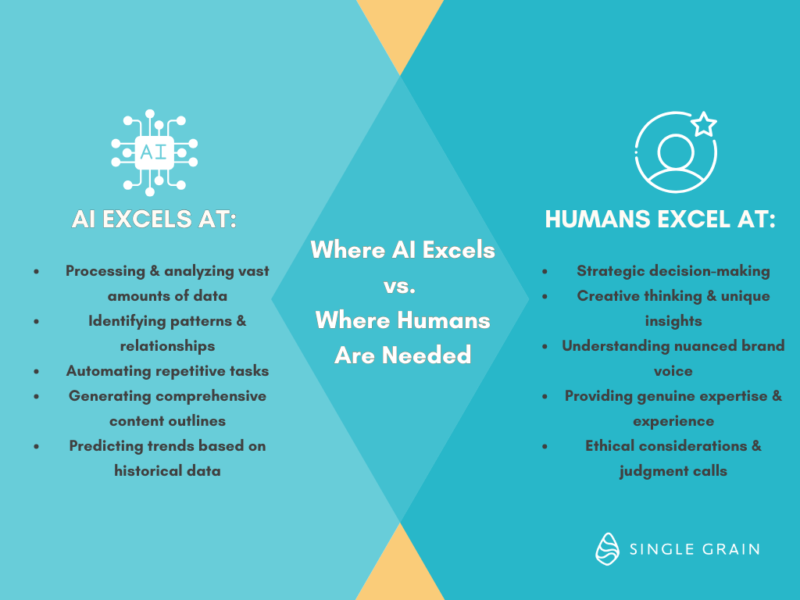
AI excels at:
- Processing and analyzing vast amounts of data
- Identifying patterns and relationships
- Automating repetitive tasks
- Generating comprehensive content outlines
- Predicting trends based on historical data
Humans excel at:
- Strategic decision-making
- Creative thinking and unique insights
- Understanding nuanced brand voice
- Providing genuine expertise and experience
- Ethical considerations and judgment calls
The ideal workflow leverages AI for data analysis and routine tasks while relying on human expertise for strategy, creativity, and final decision-making.
Creating an Effective AI-Human Workflow
To maximize the benefits of AI while maintaining the human touch that search engines and users value, consider this workflow:
- Use AI for initial research and data analysis
- Have humans interpret the data and make strategic decisions
- Use AI to generate comprehensive content outlines and briefs
- Have human experts create unique, authoritative content
- Use AI for technical optimization and quality checks
- Have humans review and refine the final output
This collaborative approach combines the efficiency of AI with the creativity and expertise of human professionals.
Ethical Considerations
As AI becomes more integrated into SEO practices, ethical considerations become increasingly important. These include:
- Transparency about AI-assisted content creation
- Ensuring AI tools don’t perpetuate biases or misinformation
- Maintaining authenticity and genuine expertise
- Respecting user privacy in data collection and analysis
- Using AI to enhance user experience, not manipulate it
By approaching AI as a tool to better serve users rather than a shortcut to manipulate search rankings, you’ll build sustainable SEO success that aligns with search engine guidelines and user expectations.
Leverage AI for Personalized LinkedIn Ads with Karrot.ai
The integration of AI into SEO represents one of the most significant shifts in digital marketing strategy in recent years. In 2025, the marketers who thrive will be those who effectively leverage AI tools while maintaining the human expertise that truly connects with audiences.
By implementing the six powerful AI applications we’ve explored—enhanced keyword research, content optimization, technical automation, voice search optimization, predictive analysis, and personalized user experience—you can gain a significant competitive advantage in search visibility.
As search engines and user behaviors continue to evolve, the relationship between AI and SEO will only grow stronger. The future belongs to those who embrace this partnership while staying grounded in the fundamental purpose of search: connecting people with the information, products, and services they seek.
Ready to transform your SEO strategy with the power of AI? Single Grain specializes in implementing cutting-edge AI-powered SEO strategies that drive measurable results. And for businesses looking to enhance their paid media campaigns, particularly on LinkedIn, Karrot.ai offers 1-1 personalized ad solutions that dramatically improve conversion rates.
Contact us today to discover how we can help you leverage AI to achieve your SEO goals in 2025 and beyond.




